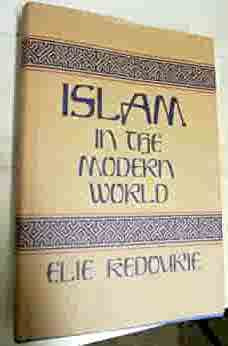 Elie Kedourie, professor of history at the London School of Economics, promises that he will explore in detail "the fortunes of Islam in the Middle East" but he does less than justice to his promise, devoting less than a quarter of his text to Islam. The book is a collection of seventeen essays following comparable collections published in 1970 and 1974. Most of the essays deal with Kedourie's two principal interests, "Great Power policies, in the [Middle East] from the first world war onwards and the coming to be and spread of an ideological-nationalist and radical style of politics in the Arab world."
Elie Kedourie, professor of history at the London School of Economics, promises that he will explore in detail "the fortunes of Islam in the Middle East" but he does less than justice to his promise, devoting less than a quarter of his text to Islam. The book is a collection of seventeen essays following comparable collections published in 1970 and 1974. Most of the essays deal with Kedourie's two principal interests, "Great Power policies, in the [Middle East] from the first world war onwards and the coming to be and spread of an ideological-nationalist and radical style of politics in the Arab world."
Kedourie's erudition is impressive. He knows remarkably much about political history, both general and Middle Eastern, the kind of detailed familiarity that comes only with decades of experience. His passionate, unconventional views are striking. Kedourie approves of very little about the twentieth century and not much more about the nineteenth, be it the Romantic movement, the trend toward greater government control, or the advent of psychohistory. Without saying so in so many words, he regrets the passing of both the Ottoman and British empires. This takes on added interest when one realizes that Mr. Kedourie grew up in Iraq, for centuries under Ottoman control and for decades under British.
One theme runs through most of Kedourie's writings – the interaction of Europe and its culture with the Middle East. He has little interest in the indigenous culture itself but is fascinated· to show, in differing contexts, its response to Europe. He calls the "spread of European ideas and techniques ... the most significant and striking theme in the modern history of Islam," concluding that it aggravated conditions in the Middle East, making Muslims "highly strung and deeply disturbed."
Unfortunate as he considers European influence, the author does not believe independence has been better. The empires meant stability. Discussing the "perils of independence" in Lebanon, for example, he notes that if Lebanese history in the twentieth century has a moral, "it is surely that independence can be as constraining as dependence, and sometimes perhaps even downright disastrous." It should be evident that Kedourie thrives on debunking current wisdom: His minority views make him a bête noire in some intellectual circles; but few of his critics have the wit and command of facts to challenge his arguments.